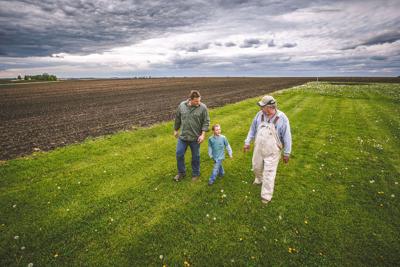With helpful, sincere guidance catered to your lifestyle, we will go over the special factors that farmers and ranchers should take into account when selecting life insurance in this book.
The Significance of Life Insurance for Farmers and Ranchers
Ranching and farming are uncertain. Risk is ingrained in the way of life, from disease and drought to fluctuations in the market and equipment failures. However, what would happen if the greatest risk—the unanticipated loss of you—came to pass?
Life insurance may:
Continue to operate the business while you are away.
Replace your family’s income.
Pay off all debts associated with your property or equipment, including estate taxes.
Make sure the ownership transition goes smoothly, particularly for farms with multiple generations.
Avoid forcing the sale of cattle or land in times of emergency.
Particular Aspects of Agricultural Life Insurance
1.The Value of Land and Equipment May Be Deceptive
Land, animals, tractors, irrigation systems, and other high-value assets are frequently found on farms and ranches, but their liquidity is often low.
This implies that even though you might appear to be affluent on paper, your family might find it difficult to get money if something were to happen to you.
What to do: Select a policy that offers sufficient coverage to make money available for debt repayment, taxes, and continuing operational expenses. Get insurance based on the entire exposure of your farm, not just your income.
2.It Is Not Negotiable to Plan for Succession
When you are gone, who will take over—your business partner, your spouse, or your children? That change can be made or broken by life insurance. It can pay for a buy-sell agreement, divide inheritance between children who choose to farm and those who do not, or provide your surviving spouse with time to make decisions.
What to do: Create a succession plan with the help of a lawyer and financial advisor, making life insurance a crucial source of funding.
3.Debt Is Unavoidable
Farm operations include operating loans, land payments, and equipment leasing. However, if you pass away unexpectedly, your creditors will still be able to collect on your debts.
What to do: If you want long-term security, think about getting permanent insurance or term life insurance that fits the period of your loans.
4.Family Matters in Farming
Your farm is more than simply a company; it is a place of residence, a legacy, and a common goal. The loss of a member is both pecuniary and emotional.
Steps to take: Clearly identify the beneficiaries. Consider how you will provide for your husband and kids, particularly if they do not have any other sources of income.
Which Life Insurance Plan Is Ideal for Farmers?
Although there is not a one-size-fits-all solution, here is a brief summary:
Term Life Insurance: Simple and reasonably priced. Excellent for paying off certain debts or financial commitments for a predetermined amount of time.
Permanent or Whole Life Insurance: provides financial value together with lifetime coverage. beneficial for protecting assets and long-term estate planning.
Insurance for Key Personnel: This can keep the firm solvent if you co-own your farm or rely significantly on a certain employee or family member.
Funding for Buy-Sell Agreements: When one partner in an agricultural partnership dies, life insurance can cover the transfer of ownership.
What to Ask When Selecting the Best Policy
How much do my assets, obligations, and yearly spending total?
When I am gone, who will manage the farm, and what will they need to be successful?
Will my family be able to maintain the farm or pay estate taxes?
What is the annual income that my family depends on me for?
What kind of legacy would I like to leave?
Conclusion: Safeguard the Life You have Created
Ranching and farming are more than just occupations; they are traditions. You endure erratic weather, work before dawn, and put your heart and soul into the soil. When you are not around to continue that legacy, life insurance helps safeguard it.
Make life insurance a topic of discussion whether you are updating your estate plan from the farmhouse kitchen table or deep in harvest season. Because your family’s future is fed by your land, not just crops.



